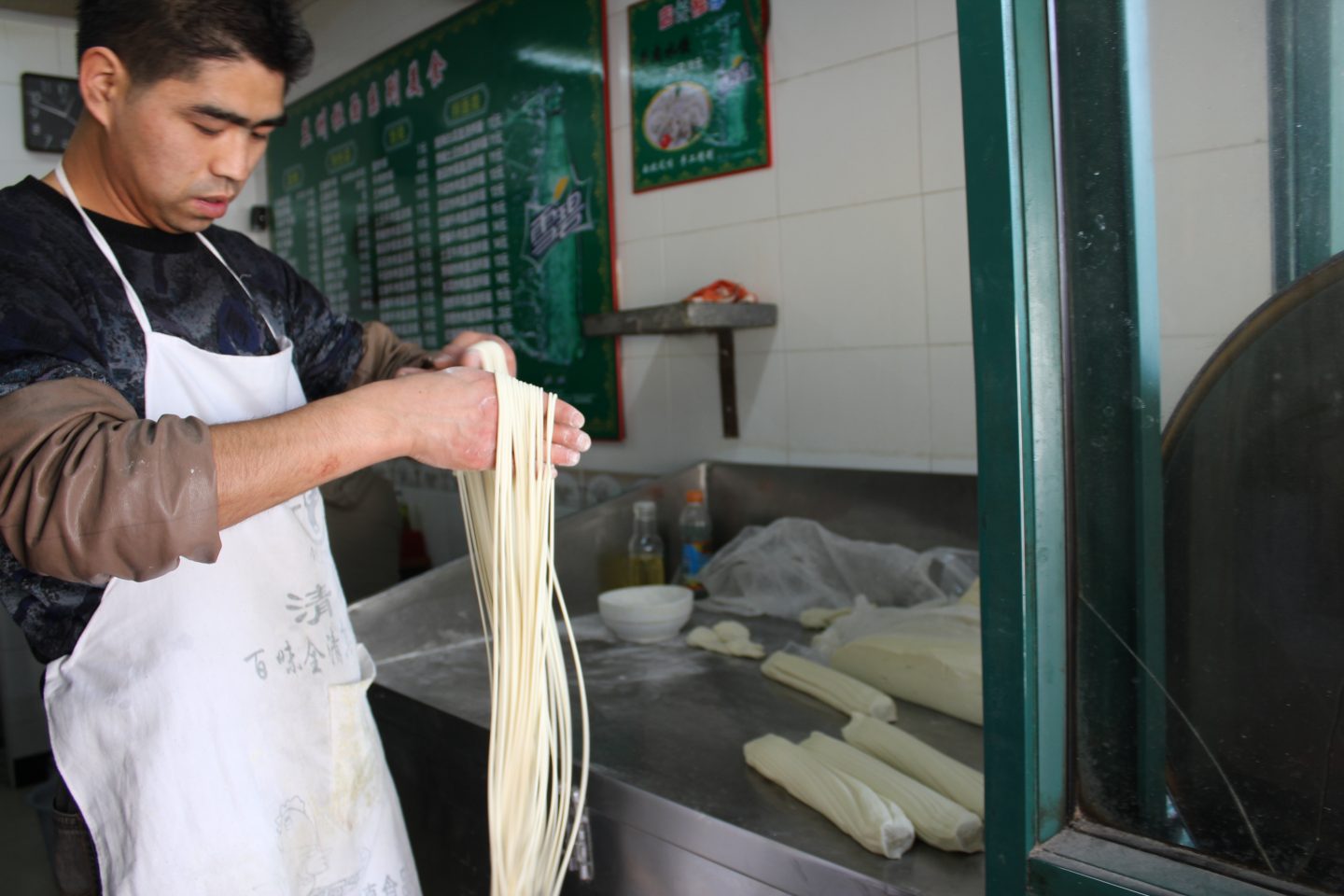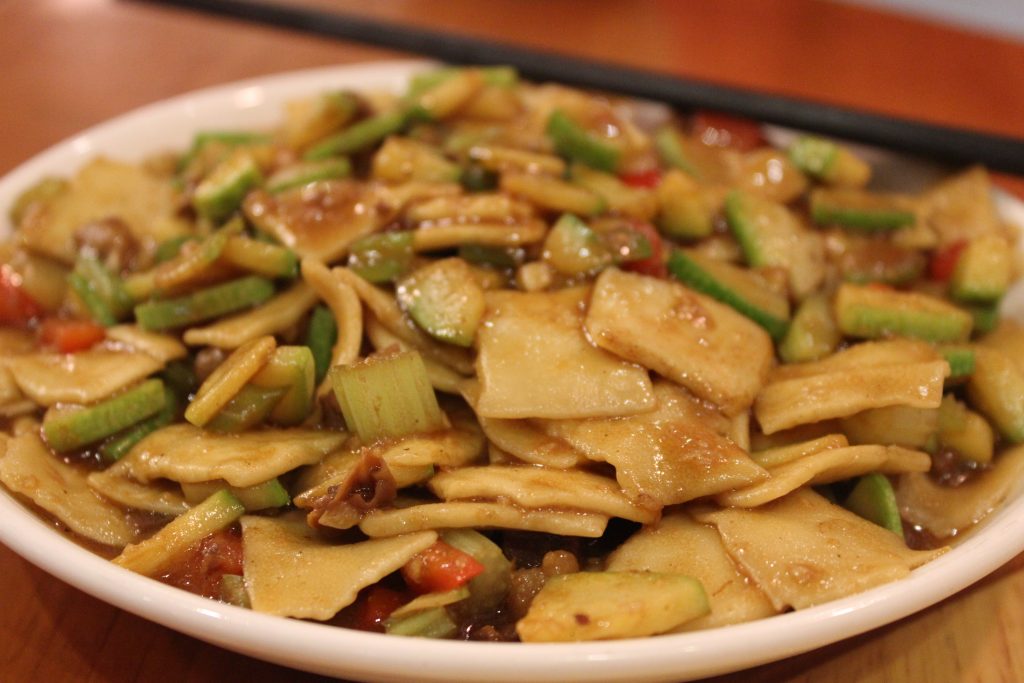Looking for Shanghai’s Best Xibei (Northwestern) food?
The food from China’s northwestern provinces of Xinjiang, Gansu, Qinghai, Ningxia and Shaanxi is culturally unique in the country. The dishes focus mostly on the halal flavors of Muslim cuisine from China’s 10 ethnic minorities who practice Islam.
The Hui minority are the largest group of Muslims in China, and their diaspora reaches well across the country to China’s eastern shores, and especially in Xi’an, the former terminal city of the Silk Road. Uighurs – the second largest ethnic group in Xinjiang – have mostly remained in the region. Uighurs are descendants from the ancient Sogdian traders once observed by Marco Polo, and unlike many of the nomadic tribes of Central Asia, the Uighurs are an urban people whose identity crystallized in the oasis towns of the Silk Road.
A walk through the bazaars of old Uighur centers such as Kashgar or Khotan reveals the physical legacy of a people rooted along the first trans-contintental trade route: an astonishing array of hazel and even blue eyes, with blonde or brown or black hair — typically tucked beneath headscarves or the customary Uighur felt cap.
The cuisine of the Hui and Uighur is halal, meaning that there is no pork (or alcohol – although beer often makes it in to restaurants in China), and all meats must be butchered halal. The cuisine often feels more Central Asian or Middle Eastern than Chinese food, thanks to the usage of strong spices like cumin and the addition of naan bread to the table.
Shanghai’s Best Xibei Restaurants – Mapped
*Tip: If you have a Google account, hit the ‘star’ in the map embed title above to save this map to your account! Remember, if you’re in China either download the map to your account for offline use, or purchase and set-up a VPN before your trip – products like Google, Youtube, Gmail, Facebook, Twitter & more are blocked. More info. *
With Chinese and English addresses listed below, you should be able to show the listing directly to a taxi driver.
The List:
A Luo Xinjiang Restaurant(阿罗新疆餐厅)
People’s Square Location:
English Address: 9F, 2-68 West Nanjing Road, near People’s Square
Chinese Address: 南京西路2-68号新世界城9楼, 近人民广场地铁站
Xuhui Location:
English Address: 2F, 1 Dapu Lu, across from SML Plaza
Chinese Address: 打浦桥路1号, 近玉兰广场二楼 (日月光对面).
Dunhuang Xiaoting(敦煌小亭)
Dunhuang, a former Silk Road oasis town in present-day Gansu province, was a historical refuge for weary travelers peddling their wares along the trade route, and this confluence of cultures influenced the ancient city’s cuisine. Merchants brought spices and cooking techniques from the West that combined with Chinese imperial culinary traditions and local ingredients. Dunhuang Xiaoting, which translates loosely as “Dunhuang Rest Stop,” offers Shanghai diners a break from the southern staples of rice and pork.
Changning Location:
English Address: 591 Dingxi Raod, near Xinhua Road
Chinese Address: 定西路591号, 近新华路
Jing’an Location:
English Address: 333 Changde Road, near Beijing Xi Road
Chinese Address: 常德路333号, 近北京西路
Xuhui Location:
English Address: B1, 580 Tianyaoqiao Road, near Lingling Road
Chinese Address: 天钥桥路580号星游城B1楼, 近零陵路
Lanzhou Lamian(兰州拉面)
At neighborhood halal restaurants around the city (of which there are hundreds), expert noodle masters create spaghetti-thin strands from fresh dough right before your eyes. Most are named after the capital city of Gansu province (Lanzhou) and the pulled noodle dish (lamian), but some of these spots will be called Xibei Lamian or Qingzhen Niu Rou Mian (halal beef noodles). Many locations are open 24-hours and feature picture menus for easy ordering, fresh ingredients and an unbelievable display of dexterity.
Huangpu Location:
English Address: 638 Middle Fangbang Road, near Luxiangyuan Road
Chinese Address: 方浜中路638弄, 近露香园街
Jing’an Location:
English Address: 326 North Wulumuqi Road, near West Nanjing Road
Chinese Address: 乌鲁木齐北路326号, 近南京西路
Miss Ali(阿里家)
Yan Ali didn’t like the way her native cuisine was often represented in Shanghai – with waiters robed in garish “costumes” and performing songs and dances from their region – and decided to create a more accurate representation of the restaurants of Xinjiang. Think wooden tables lit by bright lanterns that wouldn’t be out of place in a Turkish bazaar and walls lined with photos of the night markets in Turpan and local minority children at play in their hometowns. The well-equipped bar serves not just Xinjiang’s famous black beer, but also Belgian brews and glasses of imported wine (the meat is halal, but the booze is not).
Jing’an Location:
English Address: 2F, 20 East Yuyuan Road, near Tongren Road
Chinese Address: 愚园东路20号2楼, 近同仁路
Muslim Market
Every Friday afternoon, the area around Putuo district’s Huxi Mosque becomes a showcase of culinary delights from the city’s Muslim community. Visit the market around lunchtime to try lamb in all its glorious forms. Perfectly seasoned cumin lamb skewers are a must, but fried and oven-roasted mutton-stuffed dumplings can also be found, as well as other vendors selling traditional jewelry, precious gems and more. This market has suffered shutdowns in the past, so it’s worth checking out before the authorities further stamp out the minority culture on display.
English Address: Corner of Aomen Road and Changde Road
Chinese Address: 澳门路和常德路的路口
Zhu Que Men(朱雀门)
Shaanxi province is famous for having more than 100 types of noodle dishes, and Zhu Que Men has hand-picked some of the best strands – all made in-house – to show off the regional cuisine in Shanghai. The owner, showcasing another local specialty, carefully curates the vinegars used in each noodle dish.
Zhabei Location:
English Address: 101 Zhenping Road, near North Zhongshan Road
Chinese Address: 镇坪路101号, 近中山北路
Jing’an Location:
English Address: 477 Aomen Road, near Jiangning Road
Chinese Address: 澳门路477号, 近江宁路




Leave a Reply